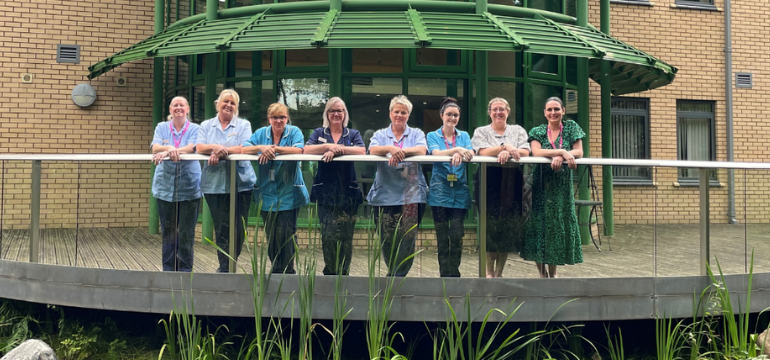Taking an inside look at the Hospice in Your Home team

Our Hospice in Your Home service was introduced in 2014, so that care could be provided for patients in their own homes. Although the team started small, they soon expanded and now include a number of qualified nurses, assistant practitioners, nurse associates, healthcare assistants and volunteers.
Separate from our Hospice Nurse Specialist team, the Hospice in Your Home team provides services which includes overnight care, carer breaks, emotional support and hands-on practical support where required.
Jan, Nicola and Julie have been a part of the team for 11 years, 19 months and 16 months respectively. Here, they share their experiences.
How did you become a part of the Hospice team?
Jan Connor
“I have been a part of the Hospice in Your Home team since the start of the service which is coming up to 11 years. I came to Wigan & Leigh Hospice as a volunteer as part of a 12 month college placement. I loved the hospice so much that when my college course finished, I stayed on as a volunteer for the next 12 years.”
Nicola Heaton
“I joined the team in November 2022. Before joining the team, I was an HCA/Phlebotomist for Wigan GP surgeries. For the last 20 years I have worked in primary care, including working as a support worker in care or residential homes. I have always wanted to support people who are housebound which is what led me to Wigan & Leigh Hospice.”
Julie Collier
“I have always worked in care, either as a healthcare assistant or support worker in different settings. Before coming to the hospice in March 2023, I had worked in a psychiatric hospital, a residential school for children with autism and other special educational needs and Bolton NHS Children’s Continuing Care, where I supported children with life limiting conditions at home, school and in the community.”
Who do the team help?
Jan Connor
“The team supports patients and their families in the community. We are an urgent response team who support those patients being discharged home from hospital, or those who wish to remain at home for their end-of-life care and avoid hospital. Patients are referred by the District Nurses, GP or other health professionals for end-of-life care.”
Julie Collier
“We help patients and their families by providing support visits. The visits can be for emotional or practical support. Patients benefit as they have someone to talk to, especially elderly or house bound, as they may not see many visitors and may experience loneliness. Sometimes our visits assist with personal cares if a patient is awaiting a care package. Families are supported and this enables them to take carer breaks, run errands or attend appointments knowing their loved one is being cared for.”
What does a day in the life look like?
Jan Connor
“My typical day could start by visiting a patient to deliver personal care as they may not have a care package set up yet. I may then go to my second visit and sit with a poorly patient to enable their loved one to attend an appointment, go shopping or have a much-needed carer break. My third visit could be a patient who lives alone, we can offer them a gentle hand massage or make them a light meal and a drink. Some patients like to talk openly about their diagnosis and prognosis as they don’t like to talk to their family about their worries and concerns. Personal care visits are approximately one hour, support visits are between ninety minutes and three hours depending on what is needed.”
Nicola Heaton
“A day in the life of people we support can be frightening confusing and we aim to help them by providing support and answers or encouragement and general support in all aspects of life.”
Julie Collier
“Each day we log onto our laptop to check which visits we have been allocated for that day. We read about each patient and review entries written by ourselves, our colleagues and other health professionals, so that we are aware of the latest updates on the patient’s condition. We usually carry out two or three home visits each shift. All visits can be different, sometimes patients enjoy good conversation and other times you recognise if a patient is unwell and wants to rest or sleep so we just stay with them and comfort them. During each visit, we complete a care plan, documenting how the patient is doing, we ask them how they are and if they have any worries or concerns. If we have any concerns about a patient, we report these to the Co-Ordinator on shift.”
What is it like to be part of the team?
Jan Connor
“I enjoy every aspect of my role and feel very privileged to be invited into a patient home when they are going through such a difficult time in their life.”
Nicola Heaton
“I enjoy getting to know patients in their own home and learning and listening to their life stories, some of them are amazing! I also enjoy being a comfort and help to people when they need it.”
Julie Collier
“I love meeting new people, talking to them and finding out all about their life and what is important to them. Not all visits are the same, there is something different every day. I feel my role is rewarding, many patients are happy to see me and enjoy good conversation and it brightens their day!”
“All the Healthcare Assistants working for Hospice in Your Home are friendly and approachable. Although we are mainly lone workers, we are always there for each other at the end of the phone.”
Find out if there are any vacancies available here.